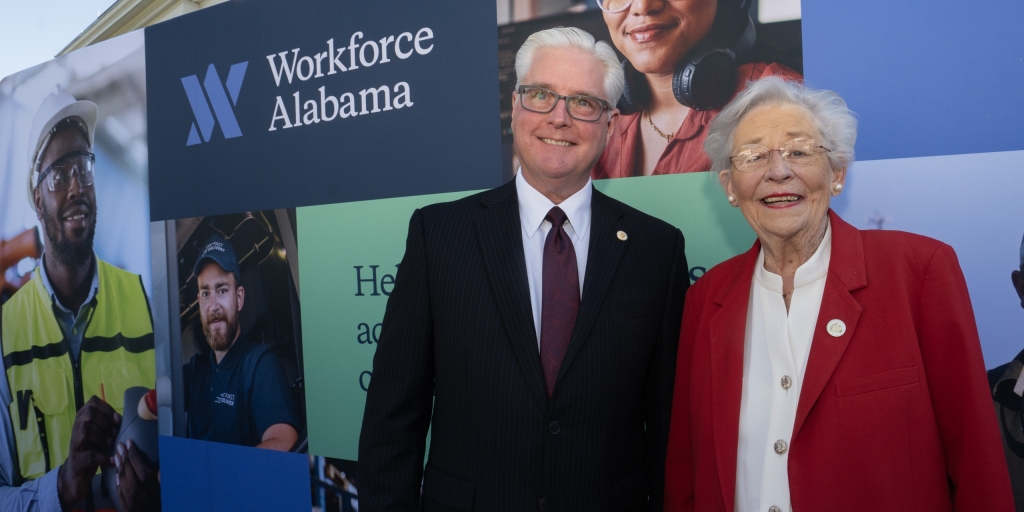Senate President Pro Tem Del Marsh (R-Anniston) and Senate Majority Leader Greg Reed (R-Jasper) recently sat down for a wide-ranging exclusive interview with Yellowhammer News, discussing the 2018 election cycle, the new composition of the Alabama Senate, the upcoming legislative session and everything in between.
The first part of this interview series examines the impressive electoral success that the Senate Republican Caucus experienced this campaign season. Marsh and Reed outlined how their strategy was formulated, as well as how it was executed with precision.
The rest of the series will look at the upcoming session with a focus on the crucial legislative priorities that the two Senate leaders shared.
Successful cycle – ‘No blue wave in Alabama’
It was a busy day at the Alabama Statehouse last week, with members in Montgomery for orientation. Amidst the excited buzz of legislators old and new, Yellowhammer News joined Marsh and Reed in the pro tem’s seventh-floor conference room, with the two leaders’ schedules already jammed pack almost four months away from the start of the 2019 session.
To start the wall-to-wall conversation, it was important to understand how the Senate – and its Republican caucus – got to where it is today.
The past quadrennium saw Senate Republicans with a supermajority already – 26 Republicans, one Independent and eight Democrats filled the chamber. However, after picking off the formerly Independent seat with Senator Donnie Chesteen’s (R-Geneva) election and holding off significant Democratic challenges elsewhere, the caucus is stronger than ever.
This historic feat did not happen overnight. As Marsh and Reed explained, a lot of planning, expertise and hard work went into the 2018 election cycle.
This started with the primaries that occurred in the spring, with the strategy and groundwork ahead of these really beginning in early 2017. Marsh outlined that, initially, Reed focused on supporting their incumbents in the primaries, while Marsh looked at the open seats that would be in play – whether that be through turnover or like the Wiregrass seat that was a pickup opportunity.
The blueprint they used in 2018 was built off of already-proven success.
“[W]here we’ve had success, in fact if you look at the policies since Republicans have been in charge and the things that have been accomplished in the state, including this great economy, a large part of that is because we went out and recruited candidates, made sure people were ready and willing to serve the state of Alabama, made sure they were able to raise dollars. And it was no different this time,” Marsh outlined.
At the end of the day, their mission was accomplished this cycle. Marsh reminisced on an initial planning meeting that he and Reed hosted before the cycle got underway.
“I remember sitting in front of my colleagues and saying, ‘My goal is to have 27 Republicans [in the Senate]. I think that’s what we should have based on this state.’ And by golly, we had 27 [after the election],” Marsh said.
He continued, “And, so if you look at the talk that was out there of a ‘blue wave,’ I think that it was made pretty clear that there was no blue wave in Alabama. People are happy with what the Republicans are doing, and they’re going to continue to be happy because we continue to bring good people down here to do the work of the state.”
The strategy
With the end result in mind, Reed began to advise on how they got there.
“I think some of the tactical pieces, to go along with what the Pro Tem said, were very important,” Reed outlined. “When you begin to look at the process and how it evolved, we tried to understand early on what the different members were doing. A lot of times, if people are looking at running or not running and those kinds of things, we worked to understand that as early in the process as we could.”
He explained that it was important to know who was running where to map out the allocation of resources and ensure that the Caucus was on track to hit the final goal of 27 members. It also helped in the long run that in many of the open seats, the primaries featured multiple candidates of “high-quality.”
“We wound up in the primary with what was a really good team. Of that 27, then you wound up with 14 of those 27 that had some kind of opposition in the general election, whether it was an Independent or a Democrat,” Reed advised.
He continued, “Then, we began to assess – looking at who were going to be the members, for whatever reason, based on their location, based on the votes in the past, based on who their opponent was going to be – and try to come up with a short list of those 14 who were going to be those that were the most vulnerable and [decide] how do we allocate our resources and our focus from top to bottom.”
With the encouragement of Marsh and Reed, all of the Republican candidates ran and worked hard. Through the leaders’ work in the background to assist the most vulnerable campaigns with much-needed resources, the funding and data were there to enable victory.
“We had some good help from different folks that were working within the campaigns,” Reed added. “You had some very capable campaign managers that we worked with closely. We had some different folks that worked with us across the board and worked with me as leader to try and help us understand, with some polling and some other things, where our focus needed to be.”
Driving the vote
While having a winning electoral strategy is always important, the only poll that matters is on Election Day. On top of all of their planning and allocation of resources, Marsh and Reed put an impetus on targeting likely Republican voters and encouraging them to exercise their right to vote.
“As we then narrowed into the election, there was a process really that was led by Senator Marsh – he and I worked on it together – that was an effort to try and work on getting out the vote,” Reed shared. “Recognizing in Alabama, that if you had the opportunity for a larger vote and you had an opportunity to get those folks to the polls, there are more of them that are Republican that not.”
Reed said Marsh “had a detailed plan” to increase turnout in conservative-leaning areas across the state and that the Republican Caucus members “bought into” this plan through the legwork of their own campaigns.
“I think the plan worked very well,” Reed remarked.
“It was aggressive, it was a plan that was focused more on just some traditional, ‘Hey, let’s do a poll and see where we are.’ This had elements of modeling and elements of much more deep data analysis that had a lot more to it to help us have much more definitive information on where we put our resources. I think it worked really well across the state,” the majority leader continued.
Marsh explained that the “bottom goal” of that plan was to get out the vote after the primaries were over.
“It’s getting out the Republican vote,” Marsh emphasized. “Our goal, as [Reed] said, through typical tactics you use plus the use of analytics, we had a whole new arena of people that we knew would vote Republican if we could get them to the polls. And we had a very aggressive campaign to do that, and I think you – the stats are already out – you look at the straight ticket voters in the state this past election, the beauty of that is we knew it would help our Senate candidates, but we also knew if you’re talking straight ticket voters, it helps every House candidate, it helps every statewide candidate – everybody benefited from that group of people we identified to get to the polls that would vote straight ticket.”
The issues on voters’ minds
While Alabamians in part were voting to continue the proven pro-growth, conservative leadership that Republicans have brought to Montgomery, there were hot button and wedge issues that drove people to the polls, too.
Obviously, this differed district-by-district, with divergent demographics and local wants and needs factoring in. However, some things stood out across the Yellowhammer State in the Senate Republican Caucus’ data analysis.
“It is different [by district], but based on the analytics – and it’s based on buying patterns and other data that’s obtained – you were able to literally send an individual mail piece to every [potential voter]. You knew who they were, and you knew based on this analytics what their issue was,” Marsh outlined.
He then said that in one district alone, different voters got different mail pieces, strictly depending on data. He gave the example that one individual may have gotten something on Second Amendment rights, while another in the same area received a piece on school choice.
Besides those two issue examples, “small government” and “efficient government” were on voters’ minds.
Marsh and Reed also pointed to the pro-life vs. pro-choice debate being a key driver of turnout, especially with Amendment Two having been featured on the statewide ballot. They added that Amendment One, regarding the display of the Ten Commandments on public property, also helped bring conservative evangelical voters out.
Then, the vocal opposition – backed by huge out-of-state liberal funding – to these popular social stances by Democrats just helped the Republicans even more.
“Through our process, we were able to identify some of that information and know how people felt,” Reed explained. “And, to Senator Marsh’s point, if we understood where they were on a number of those different issues, whatever their hot-buttons were, then being able to encourage them to go to the polls for reasons that were very important to them individually allowed us to wind up with a much higher turnout.”
Trump
Going back to the primaries specifically, Marsh added that anti-incumbency did factor in and was something that Reed and he had to account for. The pro tem attributed this largely to the “Drain the swamp” national political atmosphere spearheaded by President Donald Trump.
After the primaries, this anti-incumbency fervor was not an issue for the Republicans, as the election then tilted on strictly partisan lines for the most part. Yet, when it was Republican vs. Republican back in the spring, established records were not beneficial.
“Once you got through the primaries, then you could draw a real clear line that because these people were here and doing the right things, this economy’s great and do you want to go back the other way, here’s where the Republicans stand, here’s where the Democrats are,” Marsh advised.
He continued, “And the Democrats’ rally cry, literally, was expand Medicaid. We can tell you right now, that’s not the rally cry of Republicans. And so it became real easy after we got through those primaries.”
“But, unfortunately, I think there were people that, and I’ll use an example, there’s no two ways about it: Paul Bussman lost because he was an incumbent and had a good candidate running against him that was well funded,” Marsh said, going back to the primary caveat. “And I’m telling you, any [incumbent] candidate that cycle in a primary that had a good candidate – regardless of how good the economy was and how good the person was- that had money behind them could’ve had a problem because of this anti-establishment message that the Trump team drove home.”
Reed built off of this, saying that in the general election, some of the election results could be chalked up to a referendum on Trump and his presidency, as he remains very popular in Alabama.
“Support of the Trump agenda became a strong focus for many of our candidates,” Reed advised.
Marsh gave the example of the most competitive Senate race, which was between Sen. Larry Stutts (R-Tuscumbia) and Rep. Johnny Mack Morrow (D-Red Bay), with the pro tem saying that the “Trump coattails” factor was probably the difference between Stutts winning and losing.
He stated that their analytics had identified 8,000 more people in that district “that if they voted, they typically didn’t, but if they did they’d vote Republican.”
They were able to turn enough of this block out for Stutts to win an extremely tight battle.
When asked by Yellowhammer News if a similar situation existed in the Senate contest between Republican Andrew Jones and former Democratic Rep. Craig Ford (I-Gadsden), Marsh shared that their analytics and polling had shown that this race, while a “priority,” was not going to be as close as people in Montgomery thought it would be. The results bore their extensive data analysis out, as Jones blew Ford out by a margin of 60.6 percent to 39.2 percent.
This also reinforced their emphasis on straight ticket voting, as Ford ended up bearing all of the negatives of his Democratic past while not benefiting from straight-ticket Democratic votes.
“It was clear delineation,” Reed added of supporting Trump and his agenda in the general election. “At that point, at the end of the election cycle, we had already come through the Brett Kavanaugh issue, there had already been several things that were real focus issues at the federal level, so there was an easy way to draw a delineation between support of the president’s agenda. Whether it’s the Supreme Court, whether it’s infrastructure growth, whether it’s foreign affairs, whatever – supporting that at the state level was something that our Republican candidates could do that the others that were running really were not in a position to do. And, so, in the end, that was a strong topic – if you looked at the different issues that people were really enthusiastic about, if you were the candidate that was supporting the president’s agenda, then that was an important factor for a lot of voters.”
‘Icing on the cake’
Reed and Marsh specified that the Kavanaugh confirmation had been a large, positive spike in voter enthusiasm for Republicans, but that it gradually waned with time as the media coverage stopped and the election drew closer. However, Marsh brought up one very timely issue that certainly did not hurt conservative candidates in Alabama.
“[T]he icing on the cake was the march through Mexico of people approaching the border, which was ongoing every day,” Marsh said, referring to the caravan. “It’s almost like the closer they get to the border, the madder [Republican voters] got. So, there’s no doubt in my mind, that that was the icing on the cake, the end of the perfect storm.”
Speaking further of what solidified their electoral success, Marsh concluded that “between the analytics, the Kavanaugh [confirmation], between the march through Mexico, all that created a perfect day and allowed [the Senate Republican Caucus] to maximize” vote totals.
“And truly maximize,” Marsh added. “We won every single race we expected to win in the Senate. … It was the total defeat and collapse of this so-called Blue Wave.”
Reed stressed that their “long-term focus” paid off during the elections with “a clean sweep.” Now, the two Senate leaders will look to carry this momentum into the coming legislative session and quadrennium.
Be on the lookout for Yellowhammer News’ follow-up articles on what this will entail.
Sean Ross is a staff writer for Yellowhammer News. You can follow him on Twitter @sean_yhn













